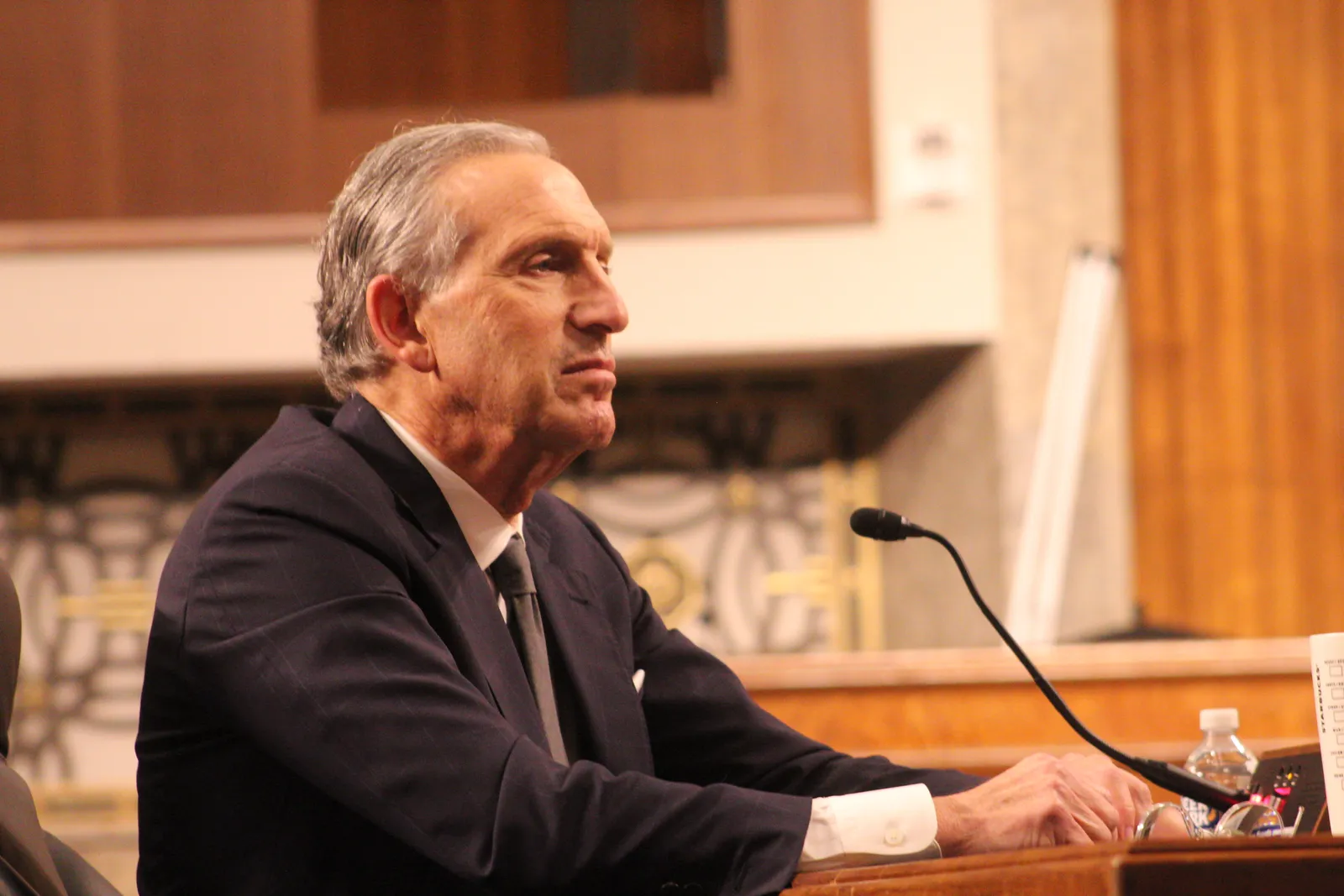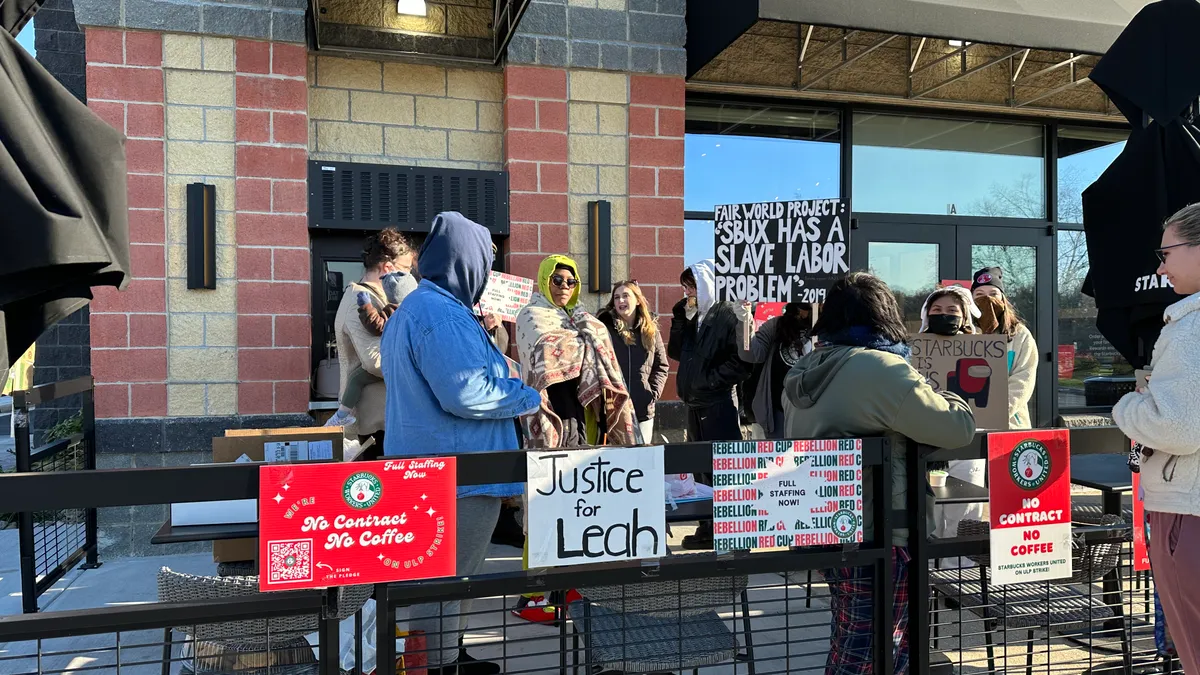Employees at Starbucks stores in Buffalo and Rochester, New York, have filed petitions with the National Labor Relations Board seeking to decertify Starbucks Workers United as the bargaining representative for those two stores, according to NLRB records.
Decertification petitions, like union election petitions, trigger an election overseen by the board where workers vote to either stay with the union or to strip it of its status as bargaining representative for the workplace.
John Logan, chair of the labor and employment studies department at San Francisco State University’s Lam Family College of Business, said the NLRB may bar the decertification elections from proceeding on the grounds of outstanding unfair labor practice complaints issued by NLRB regional offices. These complaints are based on charges filed against Starbucks by SBWU. Until such complaints are adjudicated, the board may hold that the conditions necessary for a fair election have not been met.
The petitions show Starbucks’ alleged efforts to degrade workplace solidarity, increase turnover and frustrate workers are likely working, even though SBWU continues to organize new shops and pressure the company toward bargaining. Starbucks is barred by law from directly influencing or inciting a decertification election, but the company can make workers aware of the NLRB decertification process.
Starbucks said it would remain neutral. The company has said that its preference for a direct, nonunion relationship with its workers should not be interpreted as a position on decertification.
Both stores — the Delaware Avenue and Chippewa Street store in Buffalo, New York, and the Mount Hope Avenue store in Rochester — are included in Administrative Law Judge Michael Rosas’ finding that Starbucks broke labor law in its response to the union drive in the Buffalo region. Both of these cafes are included in a complaint filed by the NLRB in March, which alleged Starbucks had illegally withheld credit card tips and other benefits from unionized stores.
Starbucks Workers United echoed Logan’s prediction that this decertification attempt will fail. “We expect the petition to be dismissed, and workers will continue fighting for justice. When Starbucks loses an election, they should learn to respect democracy, not trample it,” the union wrote in a statement emailed to Restaurant Dive.

Decertification pushes show Starbucks’ strategy is working
Starbucks insists it has not violated federal labor law. But the chain has established a coherent, if unstated, strategy to curb the union’s momentumum, labor experts have told Restaurant Dive, HR Dive’s sister publication, repeatedly over the last 19 months. Tactics include the company’s refusal to bargain in hybrid sessions — where workers participate both in person and by videoconferencing software, like Zoom — its public firings of pro-union workers and its provision of benefits to nonunion workers.
Logan says the coffee giant’s strategy is succeeding.
“It’s already working, there’s no question about that,” Logan said. “This strategy is to make the working environment worse, to drive out as many union supporters — or people who were around at the time of the original union votes — as possible, to frustrate workers about bargaining [and] to make them feel the situation is hopeless.”
Starbucks consistently has denied that it has engaged in such behavior.
But the company has made distinctions between performance at union and nonunion stores. For example, former CEO Howard Schultz said that unionized stores experience higher turnover in his Senate Health, Education, Labor and Pensions committee testimony on March 29.
The company also has played hardball with the union over its desire to include members via Zoom during bargaining sessions. More than 301 Starbucks stores have certified union representation, which obligates Starbucks to bargain at these locations to try and reach a contract.
But the coffee chain’s representatives have only appeared at around 110 bargaining sessions so far, Starbucks said. Workers have told Restaurant Dive that in nearly all instances, the company walked out of the bargaining sessions within minutes. This tactic has helped delay bargaining. Starbucks, however, blamed the union for the bargaining delays.
Starbucks has filed about 100 NLRB charges against the union over bargaining matters. Seventy-seven of those charges have been dismissed, and the remainder are awaiting merit determination, the NLRB wrote in an email to Restaurant Dive.
Mari Cosgrove, a national bargaining committee member for the union and a barista at the Seattle Reserve Roastery, has attended more than a dozen bargaining sessions in the Pacific Northwest, and told Restaurant Dive that Starbucks representatives only sporadically offer follow-up dates.
“March 22 was our last bargaining session. During the session, [Starbucks representatives] had reached out to cancel another one. They were offering us a single date, a month away in April,” Cosgrove said. “It’s nice that they’re willing to schedule a single day for bargaining, but if they were serious about bargaining, we would be getting scheduled multiple days in a row to take care of this.”
These challenges, Logan said, are likely to increase worker frustration and drive more stores to decertify SBWU. As the campaign wears on, more pro-union workers may leave their jobs or be fired, and other workers may tire of protracted bargaining, exclusion of union stores from new benefits and shop floor tensions with management.
But, Logan said the union’s campaign is far from over and the situation remains fluid and unpredictable. Hundreds of stores are trying to bargain, new stores continue to organize, NLRB offices are pursuing new unfair labor practice charges, administrative law judges are hearing cases, and national political pressure is building, shown by the recent Senate hearing.
“Starbucks management would be very mistaken to assume that this is over,” Logan said.
Starbucks Workers United expressed a similar sentiment in an email to Restaurant Dive. “More than 1,500 workers have joined our movement in 2023 alone, and this doesn't change that fact,” the union said.
When decertification petitions do reach the election stage, Logan said, the union loses most of the time because a decertification petition requires the same level of support (30%) as an initial union petition, meaning a sizable group of workers are dissatisfied enough with the union to take action.
To date, SBWU has won 308 out of 383 elections, according to NLRB records. A store in Georgia and another in Oklahoma filed decertification petitions previously. But one of those petitions was dismissed, and the other withdrawn because they were filed too close to the date of the union’s certification. The NLRB generally will not allow decertification petitions in the year immediately following the union’s certification as bargaining representative.























